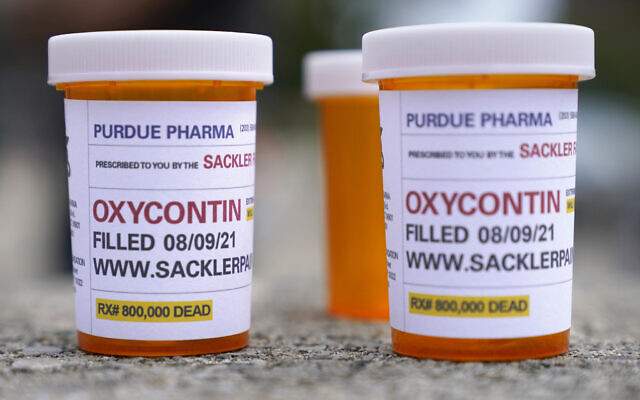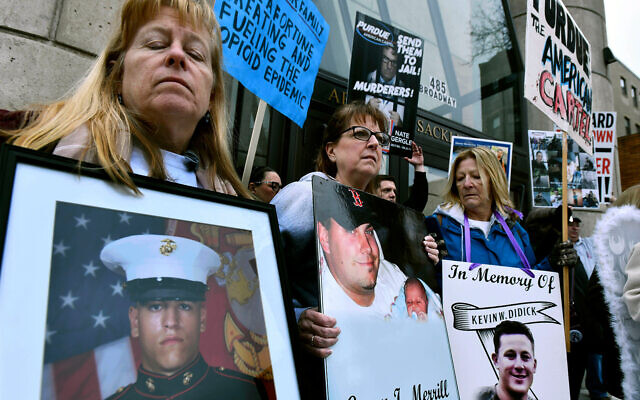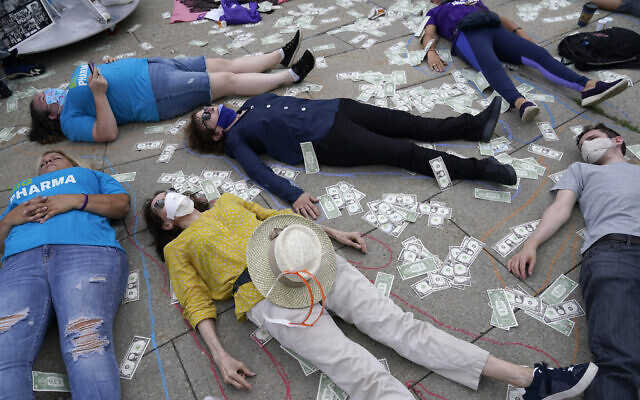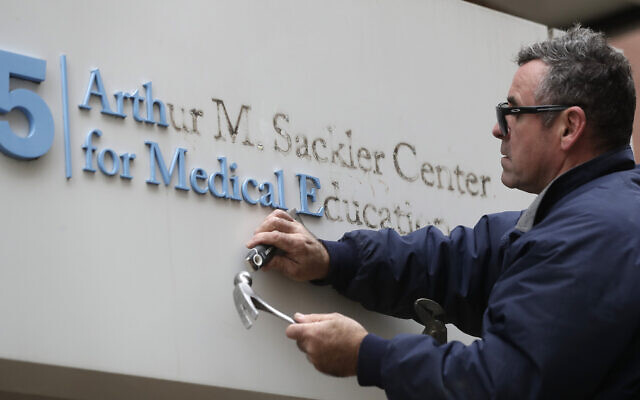Sackler family to pay $6B in deal shielding them from civil lawsuits in opioid deaths
New ruling in US federal appeals court protects Jewish family, owners of OxyContin-maker Purdue Pharma, from civil litigation, clears way for company to pay victims, families

The Sackler family, the Jewish billionaires whose marketing of the painkiller drug OxyContin fueled the United States’ ongoing opioid epidemic, will receive full immunity from all civil legal claims against Purdue Pharma, their company, in exchange for spending up to $6 billion on addiction treatment and prevention programs.
The decision to grant immunity by a federal appeals court panel Tuesday effectively ends the thousands of civil lawsuits that have been filed against Purdue Pharma over opioid deaths.
Under the plan approved Tuesday by the 2nd US Circuit Court of Appeals in New York, members of the wealthy Sackler family would give up ownership of Stamford, Connecticut-based Purdue, which would become a new company known as Knoa, with its profits being sent to a fund to prevent and treat addiction.
Family members would also contribute $5.5 billion to $6 billion in cash over time, or around half of what the court found to be their collective fortune, much of it held offshore. A chunk of that money — at least $750 million — is to go to individual victims of the opioid crisis and their survivors. Payments are expected to range from about $3,500 to $48,000.
Tuesday’s decision also protects members of the Sackler family from lawsuits over the toll of opioids, even though they did not file for bankruptcy.
The ruling reverses a lower court’s 2021 ruling that bankruptcy proceedings were an improper tool for shielding wealthy private citizens from legal repercussions. It found that bankruptcy court judges did not have the authority to approve a settlement that would offer bankruptcy protections for those who have not filed for bankruptcy.

Those protections are at the heart of the proposed deal that would end claims filed by thousands of state, local and Native American tribal governments and other entities. Sackler family members have been clear that without the protections, they won’t hold up their part of the deal.
The deal does not grant members of the Sackler family immunity against possible future criminal charges.
“It’s a great day for victims, some of who desperately need the money and have been waiting for this day for a long time,” said Ed Neiger, a lawyer representing individual victims.
Cheryl Juaire, a Massachusetts woman who lost two sons to overdoses, said she does not know what size payment to expect. “My children are gone and there’s nothing I can do to bring them back,” she said, but she said the funds would help her sons’ children. “They’ll have braces, they’ll have glasses, they’ll have things they need that they wouldn’t have otherwise.”
Sackler family members and Purdue also praised the decision.

“The Sackler families believe the long-awaited implementation of this resolution is critical to providing substantial resources for people and communities in need,” family members who own Purdue said in a statement Tuesday. “We are pleased with the Court’s decision to allow the agreement to move forward and look forward to it taking effect as soon as possible.”
Purdue founders Arthur, Mortimer and Raymond Sackler were the sons of Jewish immigrants in Brooklyn who attended medical school in Scotland because American schools wouldn’t admit Jews at the time. Mortimer and Raymond introduced OxyContin in 1996, after Arthur had left the company; the family then made billions by aggressively marketing the drug for more than two decades, even amid signs it was driving users into opiate addiction.
The three brothers have all died, but other members of the family have retained control of Purdue Pharma and their wealth, estimated at about $11 billion two years ago.
The Sackler name had been a regular presence in philanthropic circles until the opioid lawsuits began building up in 2019, at which point many cultural institutions began refusing the family’s donations and removing their name from buildings. The Jewish artist and activist Nan Goldin spearheaded a grassroots movement opposing the family for years.

One notable beneficiary of the Sacklers, Tel Aviv University, has resisted pressure to drop the Sackler name from its medical school — though the American-facing wing of its medical school quietly removed the Sackler name from its marketing materials last year.
Purdue is perhaps the highest-profile player in the opioid industry. But several other drugmakers, distribution companies and pharmacies also have been sued by state and local governments. While a handful of cases have gone to trial, many are being settled.
The total value of proposed and finalized settlements in recent years is more than $50 billion. Companies that have reached deals include drugmakers Johnson & Johnson and Teva; distribution giants AmerisourceBergen, Cardinal Health and McKesson; and pharmacy chains CVS, Walgreens and Walmart.
Only one other major opioid lawsuit settlement included payments for victims.

Most of the money is required to be used to fight the opioid crisis, which has been linked to more than 500,000 deaths in the US over the past two decades, including more than 70,000 a year recently.
In recent years, most of the deaths have been connected to fentanyl and other illicit synthetic opioids, not prescription painkillers.
Times of Israel staff contributed to this report.









